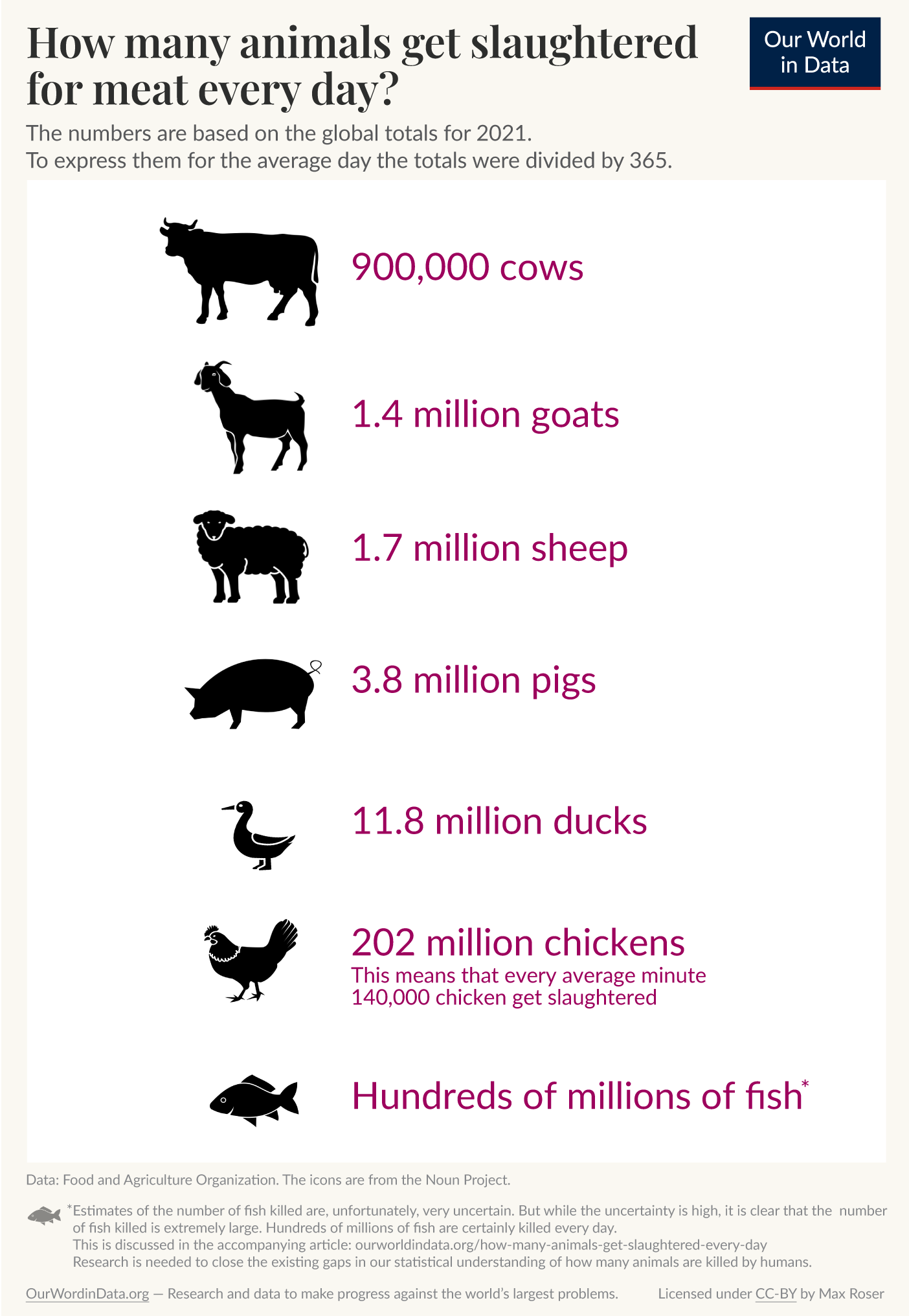Please consider stopping eating animals
I don’t know how many people reading this are vegans or vegetarians. I was a pescetarian from October 2017 to January 2020 and then, since then, stopped eating fish too.
The reason I stopped eating meat was because of an article about the number of chickens that are killed each day. You can say that the actual death is painless, but they’re reared to have terrible lives, and many of them are electrocuted to death because it’s the cheapest method.
I’m sorry if this is shocking to you, but it’s even more shocking to the chickens. Eating meat is bad for your long-term health, bad for the environment, and ethically dubious. I’m not particularly interested if you agree right now, but I’d like you consider whether you’re on the right side of history.
My plan is to eventually turn vegan. I’ve replaced most of my milk consumption, including in tea and coffee, with oat milk.

The scale of humanity’s meat consumption is enormous. 360 million tonnes of meat every year.Source: How many animals get slaughtered every day? | Our World in DataThis number is so large that I find it impossible to comprehend. What helps me to make these numbers more relatable is to turn them from the weight of meat to the number of animals and from the yearly total to the daily number. This is what I have done in the graphic below. It shows how many animals are slaughtered on any average day.
About 900,000 cows are slaughtered every day. If every cow was 2 meters long, and they all walked right behind each other, this line of cows would stretch for 1800 kilometers. This represents the number of cows slaughtered
For chickens, the daily count is extremely large – 202 million chickens every day. To comprehend the scale, it is better to bring it down to the average minute: 140,000 chickens are slaughtered every minute.
The number of fish killed every day is very uncertain. I discuss this in some detail at the end of this article. But while the uncertainties are large, it is clear that the number of fish killed is large: certainly, hundreds of millions of fish are killed every day.If you believe that the slaughter of animals causes them to suffer and attribute even a small measure of ethical significance to their suffering, then the moral scale of this reality is immense.
Are cows less valuable than wolves?
When debating with people, one of my go-to approaches is getting them to think through the logical consequences of their actions. Effectively, I’m a serial invoker of Kant’s categorical imperative: what would happen if everyone acted like this?
This article gets people to think about a world full of vegans:
Vegetarianism and veganism are becoming more popular. Alternative sources of protein, including lab-grown meat, are becoming available. This trend away from farmed meat-eating looks set to continue. From an environmental perspective and a welfare perspective, that’s a good thing. But how far should we go? Would it be good if the last cow died?Well, let's think it through...
There is a distinct difference between cattle on the one hand, and pandas and wolves on the other. Modern cattle owe their existence to selective breeding by human beings: they are very different animals from the wild oxen from which they are descended. We might think that this difference is relevant to their moral value. We might think, that is, along the following lines: we have a duty to preserve the natural world as far as we can. Wolves and pandas belong to that natural world; they occupy their place in it due to the mechanisms of evolution. So we have a duty to preserve them (not an absolute duty of course: rather one duty among many others – to our children, to each other, and so on – each of which makes different and sometimes conflicting demands on us).Right, so that's quite complex.
If we think, as I do, that being cultural is itself an adaptation, a natural feature of human beings, then we shouldn’t think that the ways in which we are cultural exempt us from nature, or that the products of our culture are themselves unnatural.In other words, we should put to one side our status of mammals at the top of the food chain when thinking about this stuff. Fascinating.
Source: Aeon